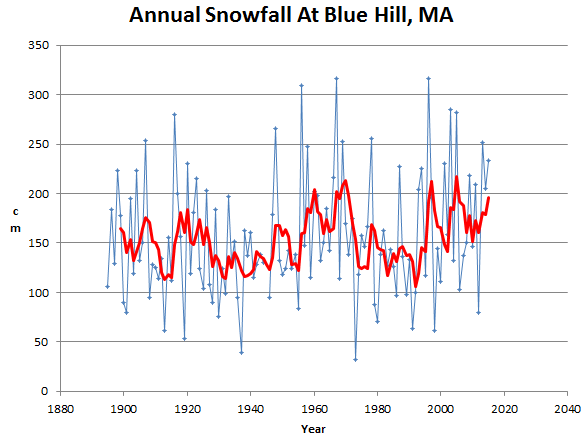Thanks to global warming, Boston snowfall is about the same as it was during the global cooling scare of the 1960’s and 1970’s.
In 1974, scientists blamed the polar vortex on global cooling and expanding Arctic sea ice. Now they are much smarter and blame the polar vortex on global warming, and shrinking Arctic sea ice.





STEVEN GODDARD—I am reposting this from the discussion at WUWT ‘theory on the pause’ posting from today where you are being discussed and dismissed by Mosher:
Steven Mosher February 15, 2015 at 8:57 pm
I am glad that finally there is someone on WUWT who can put STOP and absolute STOP to the nonsense that people are deliberately falsifying the record.
Second. Evan gets a gold start for being the first person to agree that metadata is key and that it is also problematic.
Third. Kudos for recognizing that TOBS changes records. Please please please do everything in your power to stop the nonsense that skeptics spread about TOBS.
4th; It is my opinion that there is ONE and only one issue that has any merit: micro site.
Anomalies are a non issue, adjustments are a non issue, or they are mousenut issues. microsite ( and UHI) Are GOOD ISSUES.. with real science to be done. Hopefully that science (your stuff) can be done and published
so that the real issues can be addressed. But as long as some skeptics ( like this post) just throw dirt, Evan, your Good work ( I know youve spent a lot of time) your good work , will not get a fair hearing.
Sad to say but I think some people will just lump your work with the junk that other people sling out.
That’s not fair.
You really need to clearly and forcefully distance yourself from the stupid “hoax” charges and fraud chargers.. Anthony’s issue has been microsite ( and uhi) its a good issue and I hate to see you guys tarred with the same brush as dragon slayers and cherry pickers. You are doing good work and I would hope that people would listen to your experience ( esp about TOBS) and cut the crap so your stuff can be heard in a less polarized enviroment.
5th. Of all the people who have recnetly criticized adjustment codes ( without ever looking at them) Your criticism ( what if the majority is bad) is the ONLY one that I have found may have some merit. all other critcisms pick at the edges. odd ball cases. Your’s is one that deserves investigation. we know oddball cases exist in any statitical correction. my 9-5 job is All about data cleasing with stats.. there allways odd balls. The real question is are there SYSTEMATIC problems. your concern is about a systematic issue.
GOOD problem. tough problem.
6. Can we detect undocumented changes to stations? Thats an emprical question. I think I may be able to anwser it. we can disagree.
In summary. I know you have spent a huge amount of time looking at data. getting to know the facts.
the sources. the REAL problems. For that you get 100% respect.
in simple terms the more time you and Anthony spend calling out the bullshit arguments for what they are, the more credibility you’ll have when speaking about your good arguments.
Do you have a link?
Emsnews, Try tossing this info at them:
TOBS is a complete fallacy. As long as the reading is done at the same time each day you are getting the readings for a 24 hour time period. The same type of reasoning can be applied to taking the reading first thing in the morning. You will double count an extreme low for two days. Actually reading in the morning is more likely to cause a double count error since the lowest temperature occurs after sunrise.
Also no one is going to stop what he is doing in the middle of the afternoon to read a thermometer. It is going to be read right before or right after supper. Second it is waiting too long after the heat of the day that gives false readings.
1892 Instruction Manual for Observers
So the error is likely to be reading too low and not reading too high.
Meteorology: A Text-book on the Weather, the Causes of Its Changes, and Weather Forecasting By Willis Isbister Milham 1918
Therefore the data should be available to determine if the temperature has started to fall from the high of the day and by how much.
There are also other cross checks on the temperature data. Plants: The Köppen Climate Classification
Check out the bottom graph which shows plant movement by decade.
http://www.sturmsoft.com/climate/suckling_mitchell_2000_fig2_3.gif
Study finds stream temperatures don’t parallel warming climate trend
Gee, guys maybe the stream temperatures do not match the GISS adjusted temperatures because the adjustments are bogus!
My computer is dying and I can only bring it up for a few minutes at a time.
Gail, it may be tired from so much use.
Although I suspect you copy and paste a great deal, and I am just teasing, as I appreciate your research and organization.
Of course….
“The researchers caution that the findings don’t mean that climate change will not have an impact on stream temperature, which is a fundamental driver of ecosystem processes in streams. …..”
http://wattsupwiththat.com/2015/02/15/theory-on-the-pause-climate-science-has-exhausted-adjustment-rationales/
Sorry about forgetting it. Must be losing my mind. 🙂
I’ve been shoveling and snowblowing snow for the past 3 weeks! I’ve also had to spend time on a ladder breaking up ice dams on my roof line. The temperature has been consistently below freezing for weeks and we’ve not gotten our usual mid January thaw. Where is the global warming, I need it now!
Sincerely,
“Anthropogenic warming” challenged in Boston
You are the New Buffalo.
Another blizzard is on the way mid-week this time. These are hitting me, too, in the Taconic mountains to the west of Boston.